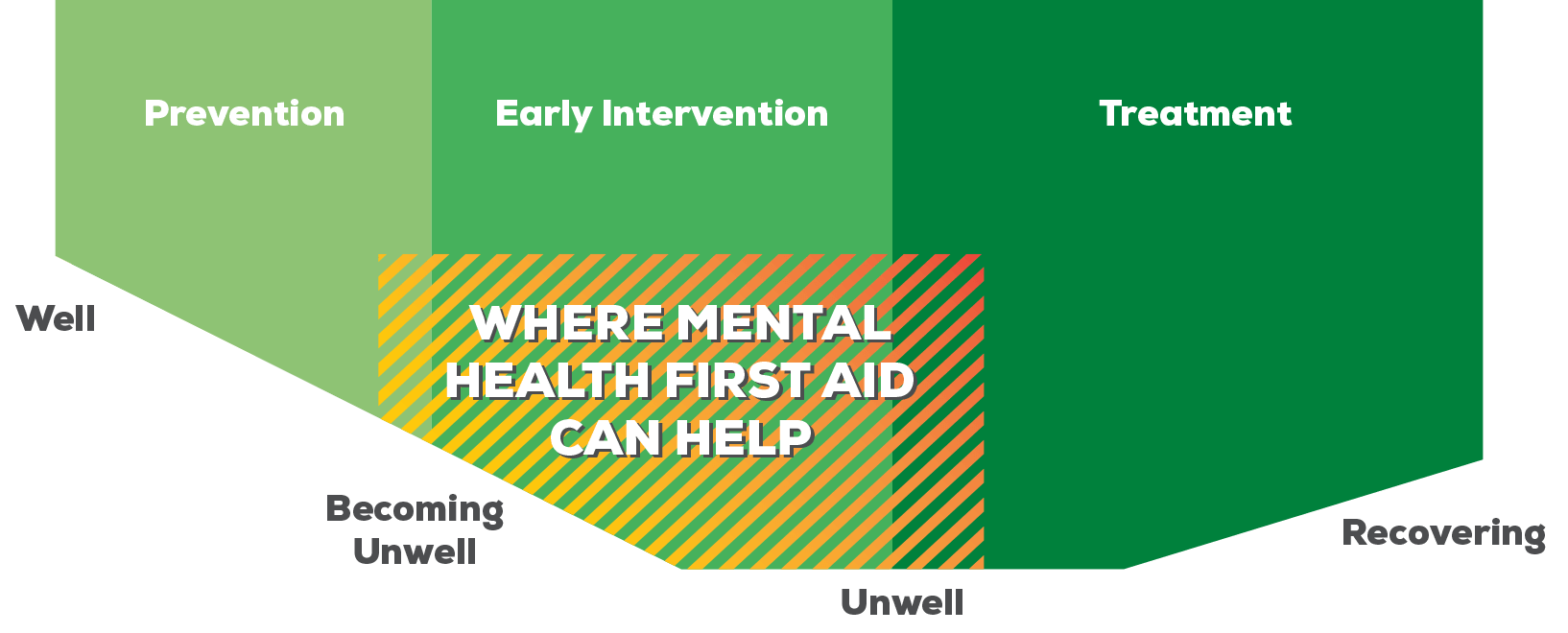The MHFA Program
We are working towards a world where everyone has the first aid skills to support people with mental health problems.
What is Mental Health
First Aid?
Mental Health First Aid (MHFA) courses are a suite of internationally acclaimed and evidence-based, accredited training programs that empower and equip individuals with the knowledge, skills and confidence needed to support a friend, family member or co-worker experiencing a mental health problem or experiencing a crisis such as being suicidal.
Why Mental Health
First Aid?
The Mental Health First Aid course is based on population health and is rigorously researched, both in terms of the content that is included in the course and evaluations of its effectiveness.
It draws on research that shows the important role family and friends have in recognising the changes in emotions and behaviours that may signal a developing mental health problem and take action to prevent the problem worsening.
There are many reasons why mental health first aid training is beneficial:

Addresses a significant global health problem
Mental health problems are common and have significant negative effects on people’s health and wellbeing. MHFA training addresses this.

MHFA training addresses a lack of knowledge about mental health problems
Many people do not have the knowledge that enables them to recognise mental health problems, how to respond to the person, and what effective treatments are available (1). Greater knowledge about mental health problems means people are better able to recognise problems in others and better prepared to offer support.

MHFA training combats stigma
There is stigma (negative attitudes) and discrimination associated with mental health problems. Stigma may lead people to hide their problems from others. It may also prevent people from seeking help (2). Better community understanding of experiences of people with mental health problems can reduce prejudice and discrimination.

MHFA training teaches people how to support others in need
Many people with mental health problems do not seek help or delay seeking help (3, 4, 5). A person’s thinking and decision-making may be clouded so they cannot take effective action to help themselves. In this situation, people close to them can facilitate appropriate help. People with mental health problems are more likely to seek help if someone close to them suggests it (6, 7)

MHFA training is effective
A number of research studies have shown that training in Mental Health First Aid results in better knowledge, attitudes and help-giving.
References
References
- Jorm AF, Kelly CM. (2004). Improving the public’s understanding and response to mental disorders. Australian Psychologist, 42: 81-9. doi: 10.1080/00050060701280565
- Barney LJ, Griffiths KM, Jorm AF, Christensen H. (2006). Stigma about depression and its impact on help-seeking intentions. Australian & New Zealand Journal of Psychiatry 2006, 40: 51-4. doi :10.1080/j.1440-1614.2006.01741.x
- Cheung, R., O’Donnell, S., Madi, N., & Goldner, E. (2017). Factors associated with delayed diagnosis of mood and/or anxiety disorders. Health Promotion and Chronic Disease Prevention in Canada: Research, Policy and Practice, 37(5), 137–148. doi: 10.24095/hpcdp.37.5.02
- Dagani, J., Signorini, G., Nielssen, O., Bani, M., Pastore, A., Girolamo, G., & Large, M. (2017). Meta-analysis of the Interval between the onset and management of Bipolar Disorder. Canadian journal of psychiatry. The Canadian Journal of Psychiatry, 62(4), 247–258. doi: 10.1177/0706743716656607
- Wang, P. S., Angermeyer, M., Borges, G., Bruffaerts, R., Chiu, W. T., de Girolamo, G., . . . Ustun, T. B. (2007). Delay and failure in treatment seeking after first onset of mental disorders in the World Health Organization’s World Mental Health Survey Initiative. World Psychiatry, 6(3), 177-185. doi:10.1001/archpsyc.62.6.603
- Cusack, J., Deane, F. P., Wilson, C. J., & Ciarrochi, J. (2004). Who influence men to go to therapy? Reports from men attending psychological services. International Journal for the Advancement of Counselling, 26(3), 271-283. doi: 10.1023/B:ADCO.0000035530.44111.a8
- Vogel, D. L., Wade, N. G., Wester, S. R., Larson, L., & Hackler, A. H. (2007). Seeking help from a mental health professional: the influence of one’s social network. Journal of Clinical Psychology, 63(3), 233-245. doi: 10.1002/jclp.20345
Spectrum of Intervention
Interventions for improving mental health within communities and helping people with mental illness sit along a spectrum. There are different states of becoming unwell, and specific interventions appropriate for each of these states. For people who are well or with some mild symptoms, prevention programs are appropriate (e.g. resilience training programs in schools, stress management courses).

For people who are moving from mild mental health problems to a mental illness, early intervention programs can be used. These programs aim to prevent problems from becoming more serious.
For people who are very unwell with a mental illness, a range of treatment approaches are available to assist in support and recovery (e.g. medical treatments, psychological treatments, complementary treatments and lifestyle changes, support groups).
MHFA – An Early Intervention Program
Mental Health First Aid is an early intervention program. However, the skills learnt in Mental Health First Aid course can be used at any point along the spectrum.
For example, mental health first aid skills may be needed at the following stages:

Prevention
Encourage self-help strategies when someone is feeling stressed, tense, irritable or unhappy.

Early Intervention
Have a supportive conversation with someone about recent changes in their behaviour that suggest they are experiencing poor mental health.

Treatment
Address crises or relapses once the person is receiving treatment
Why is Early Intervention Important?
Many people have a long delay between developing mental health problems and receiving appropriate support and treatment. The longer this delay is, the more difficult recovery can be (1, 2). During this time, support from family, friends and work colleagues is important.
These people are well placed to notice changes in emotions and behaviours that might indicate the presence of a mental health problem or mental health crisis, and support the person to take action to prevent the problem from worsening. People are more likely to seek help if someone close to them suggests it (3, 4).
References
References
- Penttilä, M., Jääskeläinen, E., Hirvonen, N., Isohanni, M., & Miettunen, J. (2014). Duration of untreated psychosis as predictor of long-term outcome in schizophrenia: systematic review and meta-analysis. The British Journal of Psychiatry, 205(2), 88-94. doi: 10.1192/bjp.bp.113.127753
- Ghio, L., Gotelli, S., Marcenaro, M., Amore, M., & Natta, W. (2014). Duration of untreated illness and outcomes in unipolar depression: a systematic review and meta-analysis. Journal of Affective Disorders, 152, 45-51. doi: 10.1016/j.jad.2013.10.002
- Cusack, J., Deane, F. P., Wilson, C. J., & Ciarrochi, J. (2004). Who influence men to go to therapy? Reports from men attending psychological services. International Journal for the Advancement of Counselling, 26(3), 271-283. doi: 10.1023/B:ADCO.0000035530.44111.a8
- Vogel, D. L., Wade, N. G., Wester, S. R., Larson, L., & Hackler, A. H. (2007). Seeking help from a mental health professional: the influence of one’s social network. Journal of Clinical Psychology, 63(3), 233-245.doi: 10.1002/jclp.20345



